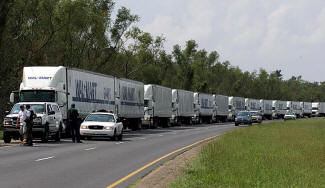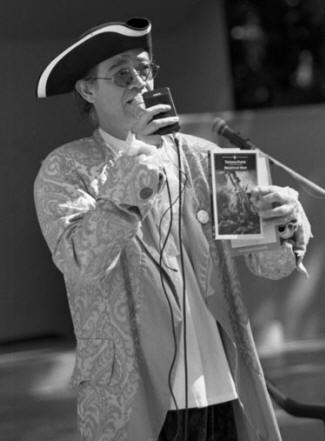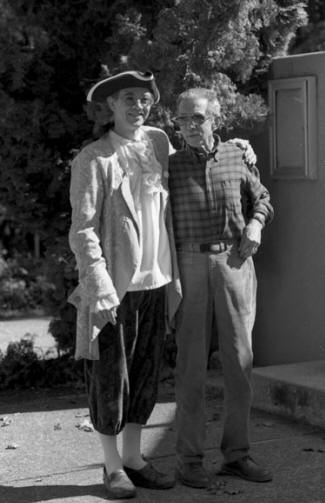IN THE WAKE OF THE FLOODby Charles Carreon
September 22, 2005

Until Katrina crashed ashore in the early morning hours of August 28th, the name New Orleans brought to mind the scent of magnolias at dusk, Spanish moss swaying in musky breezes, cypress swamps, riverboat gambling, Mardi Gras, the French Quarter, zydeco, jazz, Bourbon Street, an endless jambalaya that the city’s website celebrated with cocky pride. Today, it is a ruined necropolis where once a half a million residents worked day and night satisfying the appetites of an endless tourist throng, a toxic wasteland that will certainly be reclaimed for the benefit of industry, but may never be truly fit for human habitation, if it ever was. A giant question mark hangs over the people of New Orleans, who remain at the mercy of weather that continues to threaten tropical storms, government aid providers who move with serpentine slowness, and a news media that seems bent on painting them in the worst possible light.
“The Storm We’ve Always Feared” That was the first line of the first-ever Internet-only edition of the New Orleans Times-Picayune. They printed no paper copies, because the presses were underwater. For something they’d always been fearing, they had a mighty easygoing way of preparing for it. As the long-feared storm whirled through the gulf, it appeared as a spiral of dense clouds on satellite maps. On the ground, it hit New Orleans like hell’s own sandblaster, hurling salt water and debris at a hundred and forty miles an hour, ripping off roofs, blowing out windows, upending vehicles, and killing unprotected people and animals. All this had been long foreseen.
A flood is a special type of catastrophe that makes water, normally our best friend, into a terrible, desolating enemy. In “Life On The Mississippi,” Mark Twain recounted his observations from a relief boat dispatched by The New Orleans Times-Democrat to aid victims of the 1882 flood:
“One does not appreciate the sight of earth until he has traveled through a flood. At sea one does not expect or look for it, but here, with fluttering leaves, shadowy forest aisles, house-tops barely visible, it is expected. In fact a grave-yard, if the mounds were above water, would be appreciated.”
Scientists had long predicted a catastrophic flood in New Orleans. In October 2001, Scientific American published an article entitled “Drowning New Orleans.” Computer simulations prepared by University of Louisiana scientists predicted that when a storm caused the levees to fail, it would flood 20 feet deep in downtown New Orleans, kill as many as 100,000 people, and evict half a million from their homes and businesses. The SciAm article reviewed the failed efforts to fund the necessary ecological remediation of the region, but expressed hope that Federal funding would come through to protect the city. From June 23-27, 2002, the Times-Picayune published its five part series, “Washing Away,” subtitled “It’s Only A Matter of Time Before South Louisiana Takes A Direct Hit From A Major Hurricane.” In October 2004, National Geographic published “Gone With The Water,” another article on the impending reclamation of New Orleans by an unforgiving sea.
The real problem wasn’t mother nature, as SciAm, Times-Picayune, and National Geographic made clear. The problem was father industry. Offshore barrier islands had nearly disappeared, allowing the Gulf Coast waves to vacuum away the mainland shores. Construction projects de-silted waterways for oil rig maintenance and fishing boats, opening fresh-water wetlands to salt water, killing soil-retaining fresh-water plants and increasing erosion. Short term solutions like building levees and pumping out occupied areas chiseled away soil in a vicious cycle that erased Louisiana shoreline at the rate of six square miles per year. Commerce brought riches and disaster to the city’s door.
Strumming As The Waters Rose Gov. Blanco declared a state of emergency on August 26th, requesting assistance from FEMA with all appropriate legalities. On August 28th, Mayor Nagin ordered mandatory evacuation of New Orleans. On August 28th, Max Mayfield, Director of the National Hurricane Center, insisted on giving President Bush a video briefing on Katrina, because otherwise he wouldn’t be able to sleep that night. Mayfield also briefed Michael Chertoff, the Director of the Department of Homeland Security (DHS), informing both the President and Chertoff that Katrina would strike the coast within 48 hours with catastrophic force. The President then declared a state of emergency for the entire region, placing DHS in control of rescue and recovery.
The President was officially on vacation, but went back on the clock on August 30th to give a speech to military dignitaries in San Diego on Victory in Japan Day, remarking chummily toward the end of the speech that both he and the Japanese Prime Minister were sons of WWII fighter pilots. That’s real military camaraderie: “Your dad bombed my people, my dad bombed your people, so now we’re good!” After giving his speech, the president continued vacationing as the storm struck, the city flooded, and the rescue stalled. The President was photographed playing guitar at a barbecue, but the nation was watching Katrina.
On August 29th, Katrina made landfall at Buras, Louisiana a little after six in the morning, her winds clocking in at 145 m.p.h., but big trouble had already begun in the city three hours before, where evidence indicates the 17th Street floodwall collapsed at 3:00 a.m. By mid-morning, two other floodwalls had suffered breaches at five separate points, and water began pouring into the city from the drainage canals built to protect it. As evacuees filled the Superdome, the storm ripped two holes in the roof, which fortunately did not collapse, and merely allowed filthy rain and howling winds to enter through the gaping tears. The President in Air Force One called Chertoff on the ground, but he just wanted to talk about illegal immigration. Katrina was left in the hands of Mike Brown’s publicity machine. If only the hurricane could have been spun as easily as the media, all would have been well.
“Let Them Eat Sound Bites” The “National Response Plan” is 426 pages long, the bible for disaster professionals, but it is a safe bet that Mike Brown never read it. Mike resigned under pressure as the Director of the Federal Emergency Management Agency (FEMA). He was also fired from his previous job as the head of a horse-breeding association, but spruced up his resume with lies that weren’t discovered by the resume-readers at DHS. Then again, maybe they were looking for a loser. Mike may have been hired because he was willing to take the job of compliantly allowing FEMA to be defunded without raising a fuss. Certainly that’s what happened. FEMA’s budget was cut and cut, although that didn’t impede its performance when Hurricane Ivan hit Florida in September 2004. But Ivan didn’t hit as hard as Katrina, the money was available to fix Jeb Bush’s state in time for elections, and the publicity machine worked so well that some credited FEMA’s good performance with giving the president’s reelection campaign in Florida an extra bump.
As Brown swung into action on Katrina, he dusted off his Ivan file and shot off this press release, trumpeting the happy news that FEMA had once again saved the day: “As the Category 4 storm surged ashore just east of New Orleans on Monday, FEMA had medical teams, rescue squads and groups prepared to supply food and water poised in a semicircle around the city.”
The Cavalry Isn’t Coming The supplies began accumulating in a semicircle around the city as FEMA waited for the evacuees to emerge from the flooded pit. But by August 30th, it was obvious to Chertoff and Brown, and maybe even to the President, that the damn flood story was just going to go on and on until they did something about it. So on August 30th, Chertoff declared Katrina an “incident of national significance.” He wrote a letter declaring that the president was creating a task force, and officially gave responsibility to Mike Brown, the man with the phony resume working for the nation’s largest security agency. Three days later, Brown wrote Chertoff a letter asking him to lend FEMA a thousand DHS employees who had sunscreen and walking shorts, to volunteer to rescue the drowned southland and put a good public face on the operation. Four days later, after 700 employees from the Customs arm of DHS volunteered to help with disaster relief, Customs sent a memo to all of its employees, telling them to stop volunteering, withdraw past offers to volunteer, and just settle down to patrolling the nation’s southern border.
During the opening days of the tragedy, President Broussard of Jefferson Parish wept openly on television that he had been promised endlessly that “the cavalry are coming,” but the cavalry never came. FEMA issued press releases trumpeting the delivery of millions of packets of food, millions of gallons of water, hundreds of vehicles and thousands of soldiers to help Katrina victims. However, in New Orleans, FEMA workers are still about as scarce as a dry place to stand, and when Brown claimed that FEMA had delivered “at least one, if not two, meals every single day” to the people in the Convention Center, the Times-Picayune didn’t mince words in its response: “Lies don’t get more baldfaced than that.”
As the rescue finally found first gear, Gen. Honore explained that the huge military trucks we saw plowing through filthy waters on Monday, September 2nd had been unable to penetrate the city until then. The Times-Picayune had this to say about that: “There were journalists … going in and out of the city by the Crescent City connection. On Thursday morning, that crew saw a caravan of thirteen Wal-Mart tractor-trailers headed into town to bring food, water and supplies to a dying city. The people trained to protect our nation, the people whose job it is to quickly bring in aid were absent. Those who should have been deploying troops were singing a sad song about how our city was impossible to reach.”
For This I Went To Harvard? The first DHS Director was Tom Ridge, who resigned in February 2005. The president thought to replace Ridge with Bernard Kerik, the former top cop at NYPD, but his resume was a little flaky. Kerik turned out to be: (a) connected to the Gambino crime family, (b) a philanderer who trysted with employees in a taxpayer-financed love nest overlooking the WTO crater, and (c) a millionaire only because of a stash of inflated Taser stock he paid for by urging police agencies to buy the often-lethal stun-guns. Kerik would have made a great political cretin, and might even have handled New Orleans better, but there’s no point crying over spilled milk.
Chertoff clearly wanted to direct DHS, which was created to centralize our nation’s response to terrorist events and national disasters, because he walked away from lifetime tenure as a federal judge, generally known as the ultimate plum for lawyers, who thereby get to while away their declining years getting, as they surmise, wiser and wiser. Chertoff is a Harvard Law graduate, Supreme Court Clerk to the liberal William Brennan, and a former Assistant Attorney General who convicted whole crime families. During mid-2003, the President appointed Chertoff to a lifetime job as a Third Circuit federal appellate judge. Perhaps Chertoff would have been wise to remain on the bench. He’ll never get back there now, that’s for sure. Internal memos indicate Chertoff committed the unforgivable lawyer-sin. He was caught off-guard, apparently not realizing that disaster relief was actually his job, and when he caught the ball, he didn’t know what to do with it.
Don’t Believe Everything You See On TV Chertoff sounded out-of-the-loop when he told the press on Tuesday August 30th that he stopped worrying about New Orleans when he read in that morning’s paper that “New Orleans dodged a bullet.” Actually, this wasn’t printed in any newspaper, and the New Orleans Times-Picayune had a one-word headline that day – CATASTROPHIC! Chertoff’s statement didn’t sound that unreasonable at first, though, because during the first days of September, many news agencies, including MSNBC, kept saying that the flooding had been prevented by the levee system. We can only presume that this story came from Karl Rove, who was finally let off his leash after a suitable time in the doghouse for outing CIA-agent Valerie Plame. It had to be Rove, because only he would try to contradict the local officials desperately broadcasting from ham radios that the water was rising, that the floodwalls were failing, that the floodwalls had failed, and finally, that the drainage canals were emptying into the City. This had been the great feared event that would doom all inhabitants unable to reach higher ground, but even as the catastrophe struck, only a handful of news outlets got the story about the floodwall breaches fairly straight — The Wall Street Journal, CBS, The Times-Picayune, and National Public Radio. And aside from David Muir’s interview of salty local Joe Edwards on ABC World News Tonight, none of the major outlets leaked the news that many New Orleans inhabitants heard loud explosions and believed the floodwalls had been blown. Before you disregard this as absurd, remember that using explosives to alter the course of a flood is as common in the south as “backfiring” to prevent the spread of wildfire here in the northwest. For his part, Joe Edwards had no doubts: “I knows it happened. They blew it.”
The vast majority of news outlets engaged in a government-approved blackout on news of the swift, alarming flooding of central New Orleans, thus underplaying the story at the beginning, and providing Chertoff, Brown and FEMA with a convenient smoke screen behind which to hide – they were as ignorant as the rest of the nation! But if news was bad, Chertoff wouldn’t hear it. When NPR anchor Robert Siegel confronted him, saying that thousands of people were starving in New Orleans, Chertoff rebuffed the suggestion, cautioning Siegel that it was “dangerous to extrapolate” from “someone’s anecdotal version of something.” And when Chertoff says it’s dangerous to say something, maybe you want to shut up, unless you want a free trip to Guantanamo and lifetime room and board.
Nearer My God To Thee The evacuation of the city could not have been less successful. The City of New Orleans seemed to have given up any effort to implement an active evacuation plan. The only real plan was to issue timely evacuation orders, but when the time came, wishbone replaced backbone, officials waited too long hoping the storm would blow itself out, and the evacuation orders were belatedly given. The people trapped in the city, surrounded by and sometimes drowning in corpse-filled waters, reacted in panic, attempting to save themselves by all means. As one would expect, these were mostly poor people who don’t own cars, and depend on public transport, and public transport was missing in action. Buses weren’t deployed to ferry evacuees, and instead were destroyed in the flood. An Amtrak train that could have carried hundreds left empty when city officials declined the aid, apparently too busy to mobilize an evacuation.
The Superdome and the Convention Center, that had no supplies at all to accommodate anyone for even one night, became destinations for capacity crowds for two weeks, who had to provide their own supplies. Convoys of aid were parked outside the city’s perimeter, waiting to give aid to people once they got out of the city, but no buses were going in to bring out the stranded people. When Governor Blanco directed buses from other counties to drive into New Orleans to ferry out evacuees from the two stadiums, they sometimes refused on grounds of safety. More than three weeks after the storm hit, people are still trying to get away from the two stadiums, which have turned to miserable pits of privation, filth, and violence.
Once the FEMA disaster orders went into effect, local authorities were empowered to seize any property needed, but ironically, they most often used that power to prevent the entry of food and water to the drowning city, ostensibly in order to “discourage people from staying.” This is perhaps a new form of “tough love” being dispensed by compassionate conservatives, because heretofore, it has not been government policy to induce compliance with evacuation orders by threat of starvation.
A flotilla of private rescue boats five miles long was turned back by Louisiana law enforcement, leaving hundreds stranded who could have been saved by volunteers. The message seemed to be, “Go home, these folks are supposed to die.” And die they did. While platoons of physicians and vast stocks of medicine were blockaded outside the city, for the many sick and aged in the city’s nursing homes and hospitals, death came in hundreds of gruesome ways as life support equipment failed, food ran out, medicines couldn’t be administered, and all hope faded away. Doctors became the comforters of the doomed. No one had thought to attempt to provide an avenue of escape for these helpless people.
We Have Met The Enemy, And He Is Us Perhaps the military character of the rescue operation handicapped the mission. The transfer of disaster management authority to the Department of Homeland Security seems to have given the whole FEMA effort a draconian, military character. The good parts of the military were left out of the project. FEMA rejected an offer from the Captain of the USS Bataan, an aircraft carrier anchored offshore from the drowned city and equipped with physicians and surgeons, six operating rooms, 600 hospital beds, food and water supplies, and the ability to produce 100,000 gallons of clean, fresh water per day. By refusing to deliver aid to people trapped in New Orleans, FEMA effectively put the city under siege, a cruel and bizarre tactic that would only be used against an enemy. However, when we realize that the Iraq-trained National Guardsmen have been applying these very tactics against cities like Mosul and Fallujah, ostensibly to aid the residents, perhaps this is just the face of government aid to come.
Still, I haven’t heard that the US forces in Iraq present Iraqis who are forced from their homes with blockades that simultaneously prevent them from leaving. That would be needlessly cruel. Yet many stories were told by African-Americans who tried to pass over into neighboring areas to get away from the flood, and were driven back by armed, white lawmen who sometimes held, searched and terrorized them before releasing them to fend for themselves in the doomed city.
What Insurrection Did You Have In Mind? Of course, it’s always possible that the crucial ingredient in the delay of relief was Gov. Blanco’s skittish reaction to what looked like a Washington power grab. As the waters rose in New Orleans killing more by the hour, the administration repeatedly invited Gov. Blanco to ask the President to suppress an insurrection under the Insurrection Act, 10 U.S.C, Section 331. If Gov. Blanco had believed herself to be dealing with a revolt, she presumably would not have resisted the invitation, because the act allows the President “to call into Federal service such of the militia of the other States” to “suppress the insurrection.” But unless the attack of the wind and waves was some type of weather-war attack by terrorists, it is hard to understand what forces were in rebellion against the State of Louisiana. Still, the governor seemed pleased when FEMA sent in battle-hardened National Guard just returned from Iraq to quell civil unrest, and got rid of the notion that Democrats are soft on crime with her comment that the soldiers "have M-16s … locked and loaded. These troops know how to shoot to kill ... and I expect they will." Notably, for those watching the race issue, Mayor Nagin, an African-American and a Democrat, also demanded that soldiers shoot looters. Clearly, big city politicians, used to shouting about being tough on crime, overmatched by Katrina, an omnipotent, non-human enemy, turned their aggressive power on the only adversaries they could defeat – other people.
A Free Reality Show Perhaps it was inevitable that in a media age where “Survivor” was a big hit, that the people of New Orleans would be drafted into starring, non-paying roles in a feast of TV coverage that hovered over the agony but delivered no relief, like the news and military helicopters that mocked the residents who pled for salvation, for food, for water, for humanity, and received only pointed guns and the staring eyes of video cameras in response to their cries. Certainly it was real, all too real, for the participants, who were told to be patient, and they would get prizes – free debit cards, lotteries to own real estate. And so in modern America in 2005, where before the eyes of the world, thousands of Americans suffered needlessly, and uncounted hundreds died wretched, horrible deaths, while the mightiest nation in the world stood with its hands at its side. But then again, disasters have always been a spectator sport.
Different Strokes for Different Folks It is well known that people see different things looking at the same scene. When large numbers of people with dark skin suddenly dominate the TV for days, this is of course not some movie with a cast of thousands, because there is no such thing as a cast of a thousand black people. It’s clearly some sort of racial event, as if someone scheduled a nightmare, and invited mostly African-Americans.
Barbara Bush, audiotaped in a candid moment at the Astrodome filled with evacuees, said that, since most of “these people” were “underprivileged already, it was all working out rather well for them.” She sounded like a financial executive remarking that a rival had scored an exceptionally good deal, as she followed her quip with an avuncular chuckle. On television, African-Americans who scavenged for goods in stores were called looters, while Caucasians doing the same thing were said to be hunting for supplies. Yes, different people see things differently. Where some saw hardworking people flooded from their homes, the former First Lady saw lucky freeloaders.
Some think that FEMA’s poor response in Louisiana, compared with its response in Florida in September 2004 when the President’s brother’s state was hit by Hurricane Ivan, shows partisanship in the administration of benefits. When Florida was hurting, the declaration of emergency came immediately from the White House, and 2,000 National Guard and plenty of money poured into Florida. By the time the election rolled around a mere three months later, things were better in Florida than before the disaster, one often heard. Louisiana has also fared less well than Mississippi, which has not received the standoffish treatment like those suffering in New Orleans.
Finally, analyzed purely in terms of procedure, the evacuation of New Orleans applied the following priority, when evacuation was attempted: (1) sick people, (2) hotel occupants, who had access to some stored supplies, and (3) Superdome evacuees, who were receiving a tiny trickle of food and water, starving and dying of thirst. When we count the numbers, groups one and two were of mixed racial composition, while group three was preponderantly composed of African-Americans. How is this significant?
An Unequal Allocation of Benefits The terror of drowning lies deep in the human soul, and each victim had to face it. Many committed suicide before the last moment came. For each of them, a national debt has been assumed, and a national resolve should be undertaken. It is sad to perform the counting of white bodies and black bodies to figure out the percentages, but people will do it, each for their own purposes. An Internet posting from a white supremacist attempted to sort through the complex muddle of his bigoted feelings by expressing sorrow for the trapped white people, but finding satisfaction in the disaster nonetheless, because the hated blacks were suffering in such larger proportion. Thinking through that tangled web of cruel motivation, we see the madness of trying to judge things based on race. On the other side, African-American leaders must emphasize the imbalance in the body count and the numbers of homeless evacuees. It is impossible to deny a racially imbalanced outcome here, although the significance can be debated, as the white supremacist viewpoint makes clear. But the law also takes an interest in the numbers, when lawsuits are filed. The Supreme Court has said in race discrimination lawsuits that, where there are consistently unequal outcomes in the allocation of benefits, and those unequal outcomes fall along racial lines, the burden shifts to the party defending against accusations of prejudice to show that the unequal result was not in fact the result of racial bias. Imagine if Chertoff were on the witness stand, defending his inaction in the face of Katrina’s destruction. What would he say if asked to compare his non-response to Katrina’s devastation with the job done by Tom Ridge, who oversaw the September 2004 FEMA response to Hurricane Ivan in Florida? What explanation besides politics or race would he provide for the difference in treatment of Louisiana and Florida? Perhaps he would plead, as he has, that he was just reading the papers to find out what his job was. Perhaps, like President Bush, he'd admit he was at fault. But what explanation could he possibly provide for withholding food, water, medical care and transportation from hurricane victims, an unprecedented disaster remedy that killed hundreds and saved no one? It would be interesting to hear his answers, but he is not offering any because he isn’t on the witness stand.
The Boondoggle That Is Yet To Come It seems that the time for speeches has come again, and after initially not rising to the occasion, the President has apologized for the fumbles, which are once again now all in the past, and promised an all new plan for the future that will require vast expenditures of federal funds. The spigot is open, and the financial press is abuzz with estimates of how much money there is to be made in the rebuilding effort. Municipal funds gurus are declaring this the largest funding opportunity in history. Saudi Arabia and other oil nations have been quickest to write the checks our national government has requested to pump the money engine that will have to be stoked up to power out of this mess. A thousand Mexican soldiers are apparently coming to help out, the first time that many Mexicans have been allowed across the border at one time for over a hundred years. Although Cuba, a little over a hundred miles away, offered to send 1,100 doctors and medicine to aid Katrina’s victims, the administration has rebuffed the offer, while officially stating that it was under consideration.
There are some clouds on the horizon. Delta Airlines, a major southern employer with its hub in Atlanta, and Northwest Airlines, already on the ropes financially before the storm, pulled the ripcord together and filed for bankruptcy in New York during the first week of September. On the other hand, Wall Street knows bankruptcy can free a company from union contracts and pension fund obligations, and thus will look forward to buying airline debt and equity at fire-sale prices, and cashing in on another wave of government bailout money. In further good news for employers on the labor front, the President suspended operation of the Davis-Bacon federal prevailing wage law that would otherwise have required federal contractors to pay employees the prevailing wage in the region for their type of work, thus eliminating an obvious hindrance to reconstruction. In other words, in Washington and by implication, everywhere else in the nation, it is business as usual and full speed ahead.
My Superfund Site Is Missing, Sir In the rush to pour money into the next round of industrial subsidies, the officials are hiding one crucial fact – New Orleans is a gigantic Superfund site – a toxic waste dump so severe that it has been designated to receive federal cleanup funds. There were four Superfund sites in New Orleans, and they all were flooded and blown together into one toxic stew by the hurricane. A total of 153,000 barrels of oil are confirmed to have spilled into New Orleans. At 50 gallons per barrel, that’s approximately 7,650,000 gallons of oil adrift on the waters. The Exxon-Valdez spilled 11,000,000 gallons, so we are clearly dealing with one of the largest oil spills in history, and it is going unreported. Also unreported are the final resting places of countless barges and railcars filled with toxic reagents and used as “temporary” storage locations for toxic waste. These gigantic containers were bounced around like Dixie cups by the storm, and have been leaking for weeks, creating a brew that is biotoxic in the extreme. The owners of toxin-filled railcars and barges thus disposed of by providence would certainly have cause to observe that it is an ill wind indeed that blows no good for anyone.
Ignoring a Chemical Chernobyl? Innumerable toxic materials are now loose in the city, being spread everywhere by the flood. The floodwaters in some parts of the city cause toxic burns. The sludge that will remain after pumping is completed will be loaded with matter that should not be touched, inhaled, or ingested. The floodwaters being pumped out of the city are not being processed, and are going raw into Lake Ponchartrain, that was already polluted, and now will simply become the nation’s largest petroleum byproducts leachpit, a dead lake impounding billions of gallons of industrial refuse. Not something you’d want to live downwind from.
Quite possibly, civic leaders will ignore these unpleasant facts just as studiously as they ignored both the risk of catastrophic flooding and the need to evacuate people who didn’t have cars or were marooned in hospitals and nursing homes. Perhaps the human cost of repopulating the site of a chemical Chernobyl will merely be measured as an uptick in the already high levels of cancer that distinguish Louisiana in the national health statistics. Perhaps the affected people will never learn about the dangers, and will once again trust the assurances of their leaders that it is safe to work and live in New Orleans after the flood. Perhaps the disparity in life expectancies in our country will become more extreme, as some Americans live in safe, healthy places, and some can’t get out of unsafe, unhealthy places. That is certainly how it was in New Orleans before and during the flood, and so far there is no reason to think that it will be different in the future.










